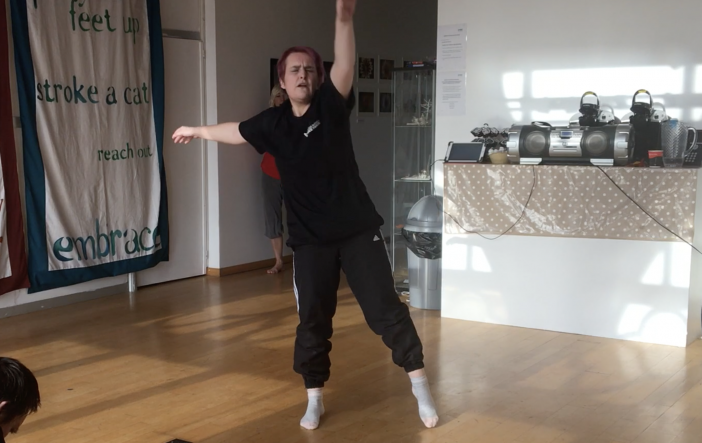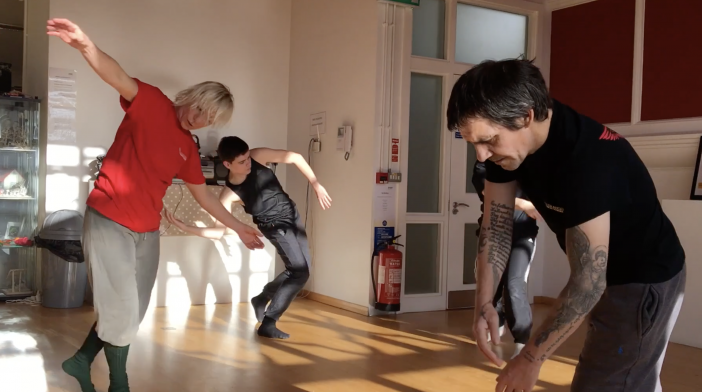A Salford dance theatre group run by volunteers is aiding the recovery of former addicts looking for a new lease of life.
Fallen Angels Salford uses contemporary dance as a physical and emotional release which greatly benefits participants’ general wellbeing.
The group does receive a small amount of funding from the NHS, but it isn’t nearly enough. As a result the group has to rely on volunteers, student placement schemes and weekly membership contributions to ease the financial burden of its discounted community rental agreement with Start in Salford.
Julia Griffen, a lecturer at Liverpool’s Edge Hill University, makes the drive up to Salford each week to deliver her class to an intimate group of regulars. Julia champions the importance of a physical release such as dance in recovery, not only in recovering from addiction, but any mental health affliction.
She said: “It’s crucial (physical activity). I think it’s one of the key components of trying to sustain a lifelong recovery.
“Medication provides a quick fix, but I don’t think it provides everything that someone in recovery needs, which is that sense of confidence building, being able to express themselves.”
When speaking to the participants of Fallen Angels Salford, it is quickly obvious how massively important the believe the group is to their recovery. Phil Kinsey “ticks all the boxes” by his own admission when it comes to his mental health ailments; he’s struggled with addiction, depression and self harm.
He said: “Since I started the Fallen Angels, I’ve not touched a drop to drink, I used to be addicted to painkillers by accident… (Now) I’m only on prescription medication and I’ve not harmed myself with a razor blade for over two and a half years. Thanks to contemporary dance and Fallen Angels, I’m making my own recovery.
“I’d say that 90% of my recovery is dance, and the other 10% is my medication. Some people argue should you stop taking your medication because dance has taken it’s place. I can’t ever fully commit to dance without my medication because it would be dangerous for me.
“It’s not just us it’s having an effect on. We are putting back to the community through what we’ve learnt with the Fallen Angels. Our families are improving in their health and lifestyle.”
Phil’s wife, Amanda Kinsey helped set up Fallen Angels Salford. Amanda is herself in recovery, while also providing care for her husband and daughter. She describes her Fallen Angels as a family, a community and an important self serving support system.

She said: “With the Fallen Angels, it’s like one big family. If someones down, you go in, you pick them up, you have a little share and that.
“We’ve got a little group on Facebook. If we’re feeling bad on that, we can all just tap into each other. It’s not just on a Friday that we all come together, we’re together 24/7.”
So, not only is a form of physical therapy provided, but a talking cure and support network as well. You would think low cost solutions such as this would be at the top of the list for NHS funding but, sadly that is not the case whatsoever.

In Manchester, a report by the MEN found that over 200 patients had been forced to wait over 90 days for treatment for their respective mental health issues. “It’s crazy isn’t it. 90 days. You could top yourself in three months.” Said Julia.
In terms of comparative cost, it’s astonishing how much small groups such as this could positively impact hospital bills: Julia, couldn’t believe how under appreciated the financial benefits of such groups are.
She said: “In terms of what Fallen Angels can do for the NHS, it’s huge. But, it hasn’t been tapped into enough. They haven’t gone, right, we can see the benefit of the recovery programs and the benefit of what dance can do to the people in those programmes and it becomes much more sustainable, this keeps people out of A&E, keeps them out of hospital and all the ward time that they have.”
This view is echoed throughout the group, with Phil suggesting the funding problem, is a problem local to Manchester: “It’s been such a struggle to get any funding at all. But, there doesn’t seem to be this problem anywhere else. You go to Preston, Liverpool, Leigh, people are throwing money at them by the thousands and we’ll be lucky to get 10 pence.” He said.
The lack of funding to support essential services in Manchester is an issue addressed recently by the Shadow Minister for Mental Health, Barbara Keeley MP, she said:
Worsley and Eccles MP Barbara Keeley MP, also shadow minister for mental health, said: “The Tory government promised extra funding for mental health, but they have not delivered.
“The crisis of funding in health and social care means that money that should go to mental health services is not reaching the frontline.”
Information about joining the Fallen Angels Salford can be found below, to access their website click here.
Are YOU looking for a fun way to manage your #mental #health? Or are you are in recovery from #addiction and want to start something #exciting? Join us at Fallen Angels #Dance Theatre #Salford for a new #adventure! pic.twitter.com/0Ml9PzhoJz
— NHS Salford CCG (@SalfordCCG) January 30, 2018














Recent Comments